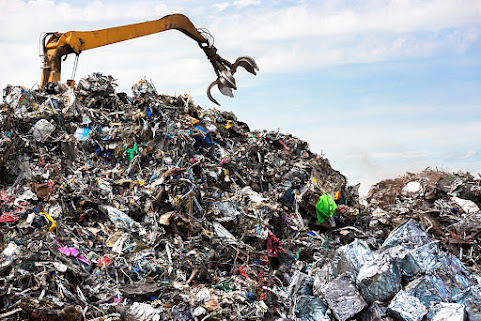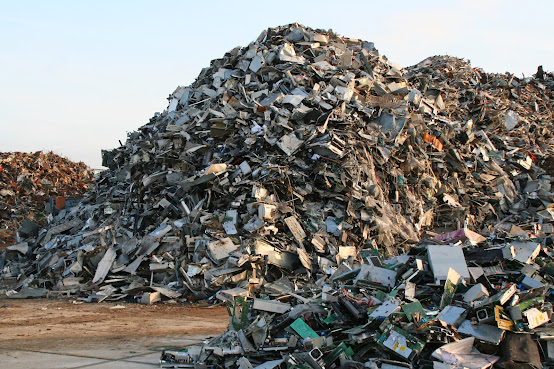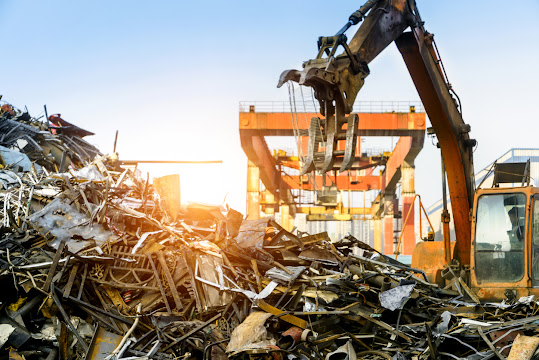immmix's blog
Metal recycling is not just an eco-friendly practice; it's a rewarding venture that can make a significant impact on both the environment and your pocket. If you're a beginner looking to dip your toes into the world of metal recycling, you're in for a treat. Not only is it an excellent way to reduce your carbon footprint, but it can also be a fun and profitable endeavour. In this blog post, we'll explore some quick and easy Metal Recycling Melbourne hacks that are perfect for beginners.
Let's dive in and discover how you can turn your scrap metal into something valuable!
Sorting Made Simple: Know Your MetalsThe first step in successful metal recycling is understanding the different types of metals. Not all metals are created equal, and they certainly don't have the same recycling process. Start by sorting your scrap metal into categories: ferrous and non-ferrous. Ferrous metals contain iron, while non-ferrous metals don't. Common ferrous metals include steel and iron, while aluminium, copper, and brass fall into the non-ferrous category. This simple sorting step sets the stage for a smoother recycling process.
DIY Metal Collection Bins: Organisation is KeyTo make metal recycling a seamless part of your routine, consider creating DIY metal collection bins. Repurpose old containers or invest in labelled bins for different metal types. Having dedicated bins for aluminium, copper, and steel not only keeps your space organised but also streamlines the recycling process. You'll find yourself more inclined to recycle when it's as easy as tossing items into the appropriate bin.
Scout for Scrap: Turning Trash into TreasureOne person's trash is another's treasure, especially in the world of metal recycling. Keep an eye out for discarded metal items in your community—old appliances, broken bicycles, or abandoned car parts. These seemingly useless items can be a goldmine for scrap metal enthusiasts. Just be sure to obtain permission before scavenging through discarded items, and always prioritise safety.
Tools of the Trade: Essential Equipment for RecyclingWhile Metal recycling in Melbourne can be a low-cost and straightforward endeavour, having the right tools can make the process more efficient. Invest in basic tools like a magnet (to identify ferrous metals), gloves, safety goggles, and a good pair of tin snips. These tools will not only keep you safe but also make it easier to dismantle and prepare your scrap metal for recycling.
Local Recycling Centres: Your Recycling PartnerNow that you've amassed a collection of sorted and prepped scrap metal, it's time to find a local recycling centre. Research and identify recycling facilities in your area that accept different types of metals. Many centres even offer competitive prices for your recyclables. Establishing a relationship with your local recycling centre can not only contribute to the recycling ecosystem but also add a little extra cash to your pocket.
ConclusionMetal recycling is a gratifying journey that transforms waste into valuable resources. By adopting these quick and easy tips, beginners can seamlessly integrate metal recycling into their lifestyles. From sorting metals to scouting for scrap, these hacks empower you to make a positive impact on the environment while enjoying the benefits of a cleaner, greener world.
Remember, every bit counts, and your efforts in metal recycling Melbourne contribute to a sustainable future. So, roll up your sleeves, start sorting, and let's make metal recycling a rewarding adventure for everyone!
Ready to embark on your metal recycling journey? Explore the world of metal recycling with www.immix.com.au/scrap-metal-melbourne. They provide valuable insights and services for efficient metal recycling. Join the movement today!
Source: Metal Recycling Hacks: Quick and Easy Tips for Beginners
Small-scale scrap metal recycling is a practice that plays a vital role in our society, contributing to both environmental preservation and economic sustainability. Understanding the challenges and opportunities in this industry is essential for individuals looking to participate in this rewarding endeavour.
In this blog post, we will delve into the process of small-scale scrap metal recycling, discuss the current Best Scrap Metal Prices in Melbourne, and explore the various challenges and opportunities associated with this practice.
I. Understanding Small-Scale Scrap Metal RecyclingSmall-scale scrap metal recycling refers to collecting, sorting, and processing metal waste by individuals or small businesses. This practice is crucial as it reduces the strain on natural resources by reusing and repurposing existing metals. Participating in small-scale scrap metal recycling is relatively simple; individuals can collect metal waste from their homes, local businesses, or construction sites. By doing so, they contribute to reducing the amount of waste in landfills and conserving valuable resources.
Apart from the environmental benefits, small-scale scrap metal recycling also presents economic opportunities. Individuals can sell the collected scrap metal to local scrapyards or buyers, generating income while contributing to the circular economy.
II. Challenges in Small-Scale Scrap Metal RecyclingWhile small-scale scrap metal recycling offers numerous benefits, it has challenges. Some of the critical challenges in this industry include:
- Limited resources and infrastructure for collection, sorting, and processing: Unlike more extensive recycling operations, individuals or small businesses may face limitations regarding resources and infrastructure. Establishing collection points, sorting facilities, and processing units can be daunting without proper funding and support.
- Addressing safety concerns when handling potentially hazardous materials: Scrap metal can sometimes contain dangerous substances such as lead, mercury, or asbestos. Proper safety measures should be taken when handling and transporting scrap metal to minimise the risk of exposure or contamination.
- Dealing with fluctuating scrap metal prices Melbourne and market demand: Scrap metal prices are subject to market fluctuations, making it challenging for small-scale recyclers to anticipate and plan their operations effectively. Additionally, changes in market demand can also impact the prices and the overall viability of the recycling business.
- Overcoming competition from more extensive recycling operations: Small-scale recyclers often face competition from more significant recycling operations that have established networks and economies of scale. Finding a niche market or focusing on specific types of scrap metal can help small-scale recyclers differentiate themselves and overcome this challenge.
III. Opportunities in Small-Scale Scrap Metal Recycling
Despite the challenges, ample opportunities in small-scale scrap metal recycling can be harnessed for success. Some of these opportunities include:
- Encouraging community involvement through awareness campaigns and incentives: Raising awareness about the importance of scrap metal recycling can help garner community support. Offering incentives, such as rewards or discounts, to individuals actively participating in recycling efforts can further encourage their involvement.
- Partnering with local businesses to establish collection points or drop-off centres: Collaborating with local businesses, such as auto repair shops or construction companies, can provide a steady supply of scrap metal. Establishing collection points or drop-off centres at these locations can make it more convenient for individuals to contribute to recycling.
- Exploring innovative technologies to improve efficiency in sorting and processing: Investing in innovative technologies can significantly enhance the efficiency of small-scale scrap metal recycling. Automated sorting systems, advanced shredders, and efficient melting furnaces can streamline recycling and improve overall productivity.
- Creating niche markets by focusing on specific types of scrap metal: Small-scale recyclers can carve a niche by specialising in particular types. For example, focusing on electronics recycling or automobile parts can enable them to cater to a specific market segment and potentially command higher prices.
Understanding the factors influencing scrap metal prices is crucial for individuals involved in small-scale scrap metal recycling. Some of these factors include:
- Supply and demand dynamics within the global market: The demand for scrap metal, particularly from industries such as construction, automotive, and manufacturing, significantly impacts its prices. Changes in global supply and demand patterns can cause prices to fluctuate.
- Economic factors such as industrial production levels and construction activity: Economic indicators, such as industrial production levels and construction activity, directly impact the demand for scrap metal. During periods of economic growth and increased construction activity, the demand for scrap metal tends to be higher, leading to higher prices.
- Government policies, regulations, and tariffs affecting trade: Government policies, regulations, and tariffs can significantly impact the global scrap metal market. Changes in trade agreements or the introduction of new rules can influence the supply and demand dynamics, ultimately affecting scrap metal prices.
- The quality, quantity, and condition of the scrap metal being recycled: The quality and condition of the scrap metal being recycled also play a crucial role in determining its price. Clean, well-sorted metal with high purity levels is more valuable and can command better prices in the market.
For individuals looking to succeed in small-scale scrap metal recycling, here are some essential tips to keep in mind:
- Educate yourself about different types of metals, their value, and where to find them. Knowledge about different types of metals and their respective values is crucial for identifying valuable scrap metals. Researching and staying updated on the market prices of different metals can help individuals maximise their profits.
- Build relationships with local scrapyards or buyers to get better prices: Developing strong relationships with local scrapyards or buyers can provide individuals with better prices and a more reliable market for their scrap metal. Regularly communicating with buyers and understanding their requirements can produce more favourable deals.
- Invest in the proper equipment for collecting, sorting, and storing scrap metal: Investing in appropriate equipment, such as magnets, scales, and storage containers, can streamline the collection, sorting, and storage process. This can enhance efficiency and productivity, ultimately leading to better profitability.
- Stay updated on current scrap metal prices through reliable sources: Keeping track of current scrap metal prices is essential for making informed decisions. Reliable sources such as industry publications, online marketplaces, and local scrapyards can provide accurate and up-to-date price information.
Small-scale scrap metal recycling offers challenges and opportunities for individuals interested in participating in this industry. Individuals can establish successful small-scale recycling operations by understanding the process, being aware of current scrap metal prices Melbourne, and addressing the challenges effectively. Moreover, participating in small-scale scrap metal recycling contributes to environmental preservation and presents economic opportunities. It is a rewarding endeavour that has the potential to make a significant impact on our society and the planet. So, let's embrace the challenges and explore the opportunities small-scale scrap metal recycling presents.
Source: Challenges and Opportunities: Small-Scale Scrap Metal Recycling Explained
If you're looking to convert scrap copper into cash, you're in the right place. This comprehensive guide will walk you through the process of profiting from scrap copper, providing valuable insights into where to find it, how to prepare it for sale, and understanding Scrap Copper Prices Melbourne-wide.
Let's dive into the world of scrap copper and discover the potential for turning discarded material into a profitable venture.
Understanding Scrap Copper: A Valuable ResourceScrap copper is a valuable commodity that can be found in various forms, including wires, pipes, fittings, and household items such as old appliances and electronics. Due to its high conductivity and recyclability, scrap copper is sought after by recycling centres and scrap yards, making it a lucrative material for those looking to make money from salvaged items.
Finding and Collecting Scrap CopperScrap copper can be found in a myriad of places, including construction sites, demolition sites, abandoned buildings, and even household items. Plumbing, electrical wiring, and old electronics are common sources of scrap copper. Keep an eye out for discarded copper items, and consider establishing relationships with contractors, electricians, and businesses that may have copper to dispose of.
Preparation for Sale: Sorting and Stripping CopperOnce you've collected scrap copper, the next step is to prepare it for sale. Sorting and categorising the copper based on its type and quality is crucial. Additionally, stripping the insulation from copper wires can significantly increase its value. Invest in a wire stripping machine to streamline the process and increase the purity of the copper, ultimately maximising the potential earnings from the sale.
Understanding Scrap Copper Prices: Factors to Consider
Scrap copper prices fluctuate based on various factors, including market demand, the purity of the copper, and global economic conditions. Keep a close eye on market trends and stay informed about current scrap copper prices. Additionally, different recycling centres and scrap yards may offer different prices, so it's essential to shop around and compare offers to ensure you get the best value for your scrap copper.
Selling your Scrap Copper: Finding the Right BuyerWhen it comes to selling your scrap copper, it's important to identify reputable and reliable buyers such as scrap yards and recycling centres. Establish relationships with multiple buyers, compare their pricing and policies, and prioritise those that offer competitive scrap copper prices. Building a network of trusted buyers can streamline the selling process and ensure a steady income from your scrap copper endeavours.
Maximising Profits: Tips and StrategiesTo maximise your profits from scrap copper, consider strategies such as bulk selling, staying informed about scrap copper prices Melbourne, and investing in efficient tools for processing and preparing the scrap copper for sale. Additionally, networking with other scrap collectors and staying updated on industry news and market trends can provide valuable insights for optimising your scrap copper venture.
Environmental and Social ImpactIn addition to the financial incentives, recycling scrap copper also contributes to environmental sustainability by reducing the need for new copper production and diverting metal waste from landfills. By participating in the recycling industry, you're not only making money but also making a positive impact on the environment and promoting sustainable practices.
ConclusionIn conclusion, making money from scrap copper can be a profitable and environmentally conscious endeavour. By understanding where to find scrap copper, preparing it for sale, staying informed about scrap copper prices Melbourne, and identifying reputable buyers, you can turn discarded copper into a lucrative income stream. Maximise your profits by implementing efficient strategies, and remember the positive impact your efforts have on the environment. With the right approach and diligence, scrap copper can be a valuable resource for generating income while contributing to sustainable practices.
Source: Making Money from Scrap Copper: A Comprehensive Guide
In our modern world, recycling has become increasingly important in order to promote sustainability and reduce waste. One area of recycling that often goes unnoticed is scrap metal. Scrap metal is a valuable resource that can be reused and repurposed, benefiting both the environment and the economy.
In this comprehensive guide, we will delve into the world of Scrap Metal Melbourne, exploring its various types and how to identify them. By the end of this guide, you will have a thorough understanding of the importance of scrap metal recycling and how you can contribute to the circular economy.
What is Scrap Metal?Scrap metal refers to any metal that has been discarded and is no longer in use. This can include a wide range of materials such as aluminium, copper, steel, brass, and iron. Scrap metal can be generated from various sources, including construction sites, manufacturing processes, and consumer goods.
Types of Scrap MetalThere are several categories of scrap metal based on their composition and characteristics. Let’s dive into various categories
- Ferrous Metals
Ferrous metals contain iron and are magnetic. Examples of ferrous metals include steel and cast iron. These metals are widely used in construction, automotive, and manufacturing industries due to their strength and durability. They are also the most recycled materials in the world.
- Non-Ferrous Metals
Non-ferrous metals do not contain iron and are not magnetic. Examples of non-ferrous metals include aluminum, copper, brass, and lead. These metals are highly valued for their corrosion resistance, conductivity, and malleability. They are commonly used in electrical wiring, plumbing, and electronics.
- Specialty Metals
Specialty metals refer to metals that are less commonly found and have unique properties. Examples include titanium, nickel, and zinc. These metals are often used in specialised industries such as aerospace, medical, and electronics. Due to their high value and limited availability, specialty metals are highly sought after in the scrap metal Melbourne market.
How to Identify Scrap Metal?Identifying different types of scrap metal can be a valuable skill when collecting or selling scrap. Here are some practical tips to help you identify scrap metal
- Color
Different metals have distinct colours. For example, aluminium is light grey or silver, copper has a reddish-brown hue, and stainless steel is silver.
- Weight
Each metal has a different weight. Aluminium is lightweight, while steel is much heavier. You can compare the weight of the metal in question to known samples for a more accurate identification.
- Magnetism
Ferrous metals are magnetic, so if a magnet sticks to the metal, it is likely made of steel or iron. Non-ferrous metals, on the other hand, are not magnetic.
- Distinguishing Marks
Some metals may have distinguishing marks or labels that can help identify them. Look for stamps, logos, or markings on the metal surface.
ConclusionScrap metal recycling plays a vital role in promoting sustainability and reducing waste. By recycling scrap metal, we can conserve natural resources, reduce greenhouse gas emissions, and support the circular economy. Let's do our part in reducing waste and preserving our planet's resources through responsible scrap metal Melbourne recycling.




